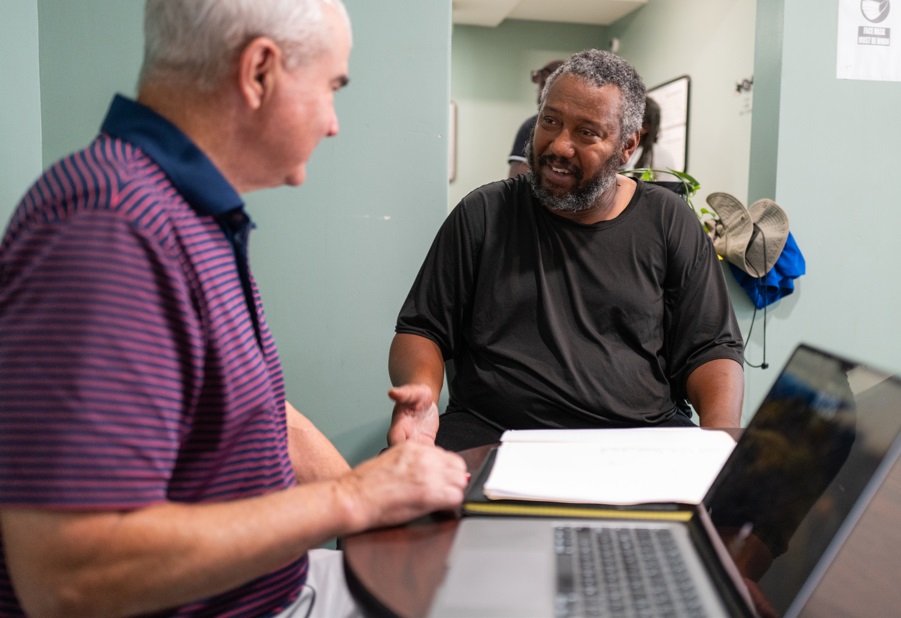At Mulumba House in Washington, D.C.’s Shaw neighborhood, Daniel Kinard talks about the challenges of returning to the city where he was raised after spending almost 34 years in prison. He struggled to find both a job and his new place in a family he’d been separated from since he was arrested at the age of 18.
Feeling desperate at times, Kinard says, he looked “to the streets” to make money. Then, last February he started meeting with Don Hathway, a mentor with the Financial Stability Network (FSN). A program of Catholic Charities, FSN provides free one-on-one financial mentoring, tax preparation and financial education for low- and moderate-income individuals and families.

Now, with Hathway’s help and a job at Langston Golf Course in Northeast D.C., Kinard, 53, is saving money and planning a future that he hopes will one day include marriage, a home of his own and a boat. “I tend to be the first one to jump up and spend money on others, but Don’s taught me to be patient, to understand that I can’t help anyone else if I’m digging a deeper hole for myself,” Kinard says.
“I want to be just like this guy when I grow old,” adds Kinard, turning toward Hathway, 71, who sits next to him. Hathway — wry and down-to-earth — chuckles quietly and says, “Daniel, you might want to set your sights a little higher.”
In a special collaboration, FSN has teamed up with Catholic Charities’ Welcome Home Reentry Program to provide financial education to those who were formerly incarcerated. Mulumba House provides housing for men who are returning to the community from incarceration and participating in the reentry program.
Kinard and Hathway meet monthly in person, usually at Mulumba House. Once Kinard invited Hathway to meet him for lunch at Langston, where they worked on his finances and then hit a few golf balls together.
Hathway has been volunteering with FSN since it was launched in fall 2016 – the year after he retired from the international financial services company, Deloitte, where he worked for 40 years in accounting and auditing services. In addition to serving as a mentor, Hathway also manages FSN volunteers, matching clients with mentors.
When they meet, Hathway encourages Kinard to save money and keep track of his spending. They go over Kinard’s financial plan and goals, measuring the progress he’s made since their previous meeting. They were elated when they discovered last June that Kinard’s credit score was 692 — evidence that he was making his car payments on time.
“I’ve learned that knowledge brings power,” says Kinard, who was hired at Langston as a porter to clean bathrooms and the pro shop. Promoted to supervisor of general maintenance, Kinard now leads a crew of 11 and hopes to continue moving up in the company that manages the course.

FSN was launched under the leadership of Jim Shanahan, who serves as its director. Shanahan, a permanent deacon assigned to the Church of the Little Flower in Bethesda, Md., retired as a partner from PricewaterhouseCoopers after 39 years with the global financial services company.
Shanahan says “the North Star for FSN is economic justice for all” — the principle that everyone has the right to dignified work and to fair wages and working conditions. “Many of our clients are unemployed or woefully underemployed. We help them break through the barriers that are holding them back by walking alongside them as they work toward their goals.”
- 125+ volunteers assisted the Financial Stability Network in fiscal year 2024.
- 5,000+ volunteer hours were spent serving 970 clients.
- $2,000 was the average tax refund for clients.
- $500 was the average savings on tax preparation fees for clients.
Available to clients is the FSN Academy — a combination of classes and individual mentoring for groups of about 10 people facing similar life challenges. An academy cohort could be a group of Spanish-speaking immigrants or clients dealing with housing insecurity or returning from incarceration, for example. Kinard has participated in an FSN Academy for reentry program participants at Mulumba House while working with Hathway.
One of the biggest hurdles to financial security for many FSN clients is not having a bank account. In keeping with its mission of providing financial education, FSN works with clients to help them understand the benefits of keeping their money in a bank. A client with an account can have their paychecks directly deposited in the bank. If they e-file their tax return, refunds will be deposited directly as well.
FSN also offers tax preparation services for those who earn less than $67,000 a year. FSN volunteers who work with tax clients have been specially trained in the use of software provided by the IRS’ Volunteer Income Tax Assistance program. FSN has filed more than 3,000 returns and generated more than $5.5 million in refunds since 2017.
Volunteers are key to FSN’s success in mentoring, education and tax preparation services. Many FSN mentors have worked in the finance industry, but experience in the field isn’t required, Shanahan says. “It’s more important that you understand the process of sticking to a budget, paying your bills on time, saving your money — basically, the process of running a home.”
More important, says Shanahan, is demonstrating what Pope Francis calls the “art of accompaniment” — meeting people where they are and walking with them in compassion and love.